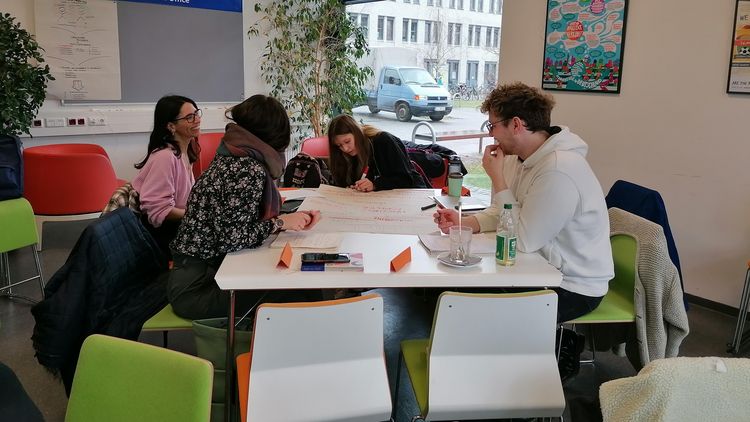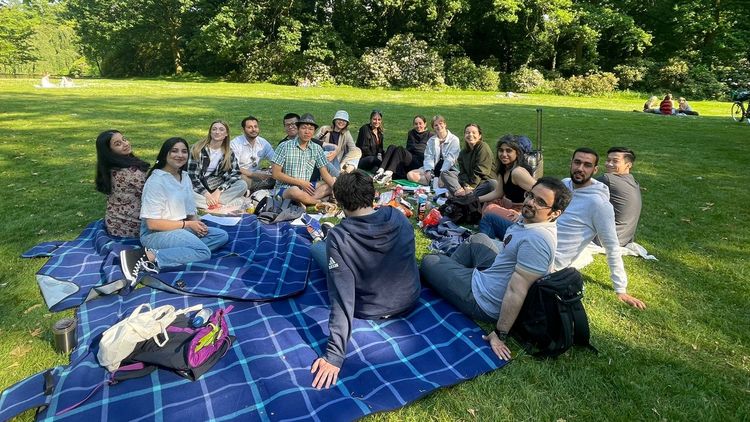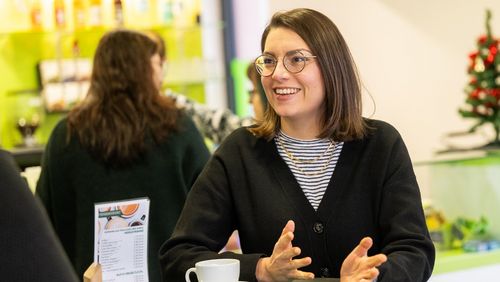The University does many things to make settling in easier for international students in Oldenburg. Intercultural facilitators listen to their problems and offer support and guidance – and there’s also plenty of fun to be had and new friends to be made.
When Petrus Prinsloo started studying in Oldenburg last October, he felt out of place at first. The South African exchange student from Nelson Mandela University in Gqeberha is studying for a master's degree in chemistry. "I didn’t have many acquaintances and wanted to meet people from outside my research group so that I may have an easier time adapting to my new, foreign environment", he says. And like so many other international students, he also had problems with German bureaucracy – even setting up a bank account turned out to be complicated. That Prinsloo now feels quite at home in Oldenburg is thanks in no small part to Charles Good. Charles is British, has lived in Oldenburg for five years now and is studying to become a teacher in history and English language and literature. Charles and Petrus met at a "Cheer-Up Meeting" organised by the university's International Office (IO). These get-togethers offer international students the opportunity to network with other international and local students and discuss the challenges of everyday life in Germany.
„Acculturation stess” is a problem
"Various studies have shown that the drop-out rate among international students is significantly higher than among German students," explains Katja Kaboth-Larsen, the initiator of the programme. "We’ve already seen people drop out of their studies because of the bureaucratic hurdles or because they find it difficult to develop a sense of belonging in a foreign country." This is also known as "acculturation stress": a new language, different food, different mentalities and attitudes – all these factors can be very unsettling for those who are new to Germany. The IO launched the English-language Cheer-Up Meetings as part of its Orientation Plus programme in 2022, to help international students find their feet in Oldenburg. "Cheer-Up Meetings are a place where first of all you can get your problems off your chest," explains Charles. “Later, we move on to more cheerful things like discussing Christmas traditions in different countries or exploring Oldenburg's nightlife together.” The three-hour meetings, which take place six times per semester, are organised by students who have already been at the University of Oldenburg for some time and have trained as "intercultural facilitators". As Bachelor's students with an extracurricular career goal, they receive extra credit points for this. Participants in the training sessions learn to provide guidance for the challenges that international students typically face, such as language barriers and bureaucratic obstacles, and also receive training in intercultural communication and how to use organisational tools for planning and holding the Cheer-Up Meetings.
A big problem for international students in particular is loneliness. Moustafa Almanla, who comes from Syria and is studying for his master's in Neuroscience, can testify to this. In the beginning he had barely any contact with people beyond the seminar room and his part-time job, and didn’t feel quite at home in Germany. Then he made new friends – including Peter and Charles – at the Cheer-Up Meetings. Participants at the Cheer-Up Meetings also help each other with everyday practical problems: Petrus was given tips for a pending visit to the optician, for example, and students from Iran got advice on what type of olive oil to buy.
The facilitators do also benefit
However, not only international students benefit from the meetings, their facilitators do too – Marina Else, for example. Marina is studying philosophy and history and took the Orientation Plus module mainly because she wanted to develop her intercultural skills. And it worked, she says, explaining that she now finds it easier to approach people and socialise with international students. As an intercultural facilitator, you also develop your problem-solving skills. "A few international students told us at the first meeting that they hadn't been able to find a flat," Marina explains. So she and the other facilitators put them in touch with the relevant departments at the University, which then helped them find accommodation. The facilitators also gave them practical tips on how to communicate at the office, on the bus and at the supermarket checkout. "Some internationals speak hardly any German, so there are sometimes misunderstandings, for instance, when the cashier asks whether you want to pay in cash or by card," says Marina. The facilitators went over a few words and standard phrases with the students to help make shopping easier for them.
Marina sees conversations about differences in the mentality and cultural characteristics of (northern) Germany as particularly valuable because they offer Germans like her the opportunity to look at their own country from a completely different angle and examine themselves critically. Meanwhile, Charles, who is British, had no difficulties settling in in Oldenburg and felt at home at the University right from the start. Now he wants to make this possible for others. As an international student himself, he has often said things like "yes, I know how that is" or "I feel the same way" at the meetings, so he comes across as very genuine. "I've already had a lot of fun hanging out with Moustafa and Petrus, and we still have a lot of contact," he says.
All the participants recommend the Orientation Plus module and the Cheer-Up Meetings and are glad to have taken part. Charles notes that the programme can be particularly helpful for student teachers: "School classes are becoming increasingly heterogeneous, with children from a variety of cultural backgrounds, so taking part in the Cheer-Up Meetings is good preparation for working at schools later on."





